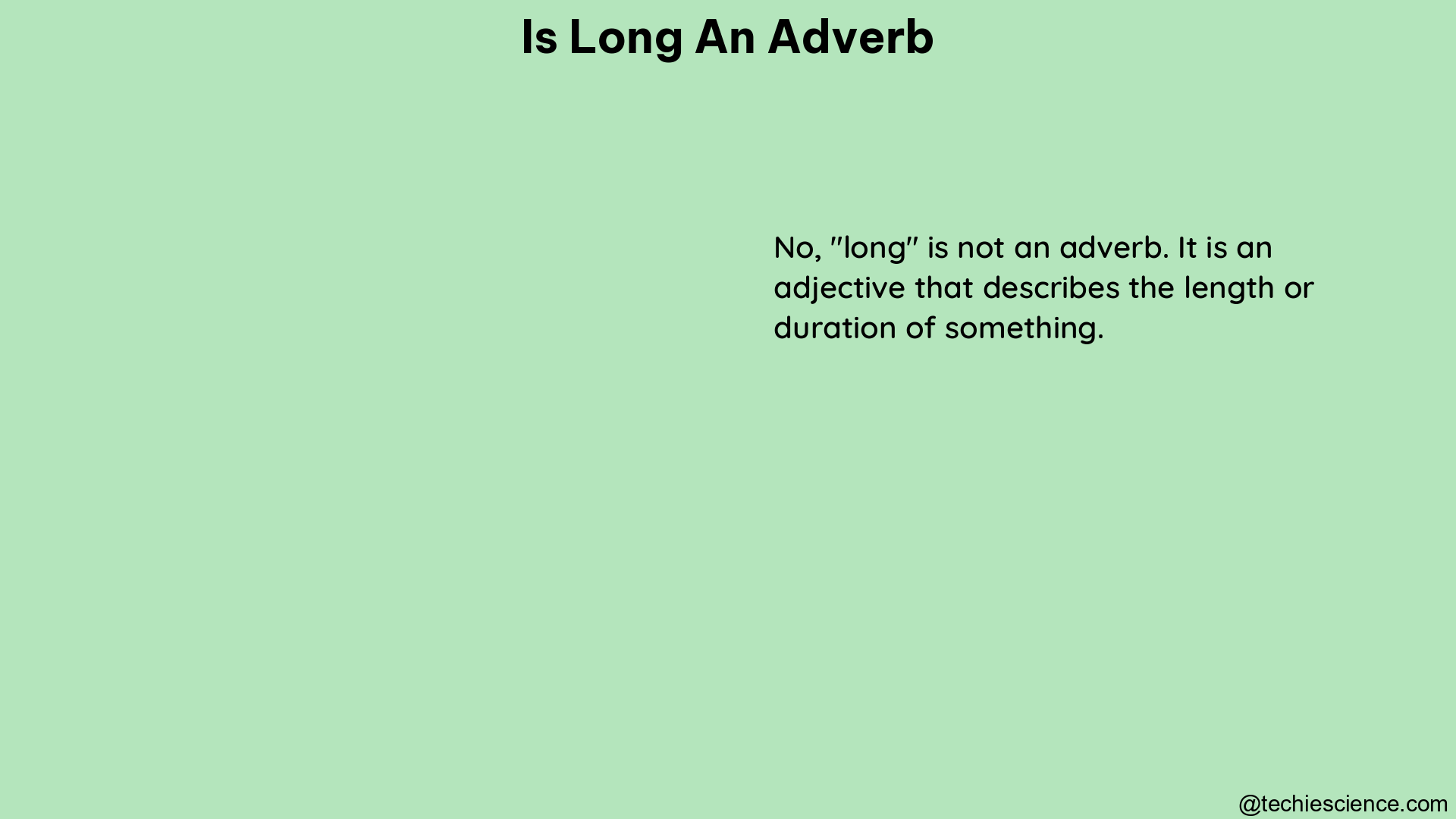Yes, “long” can function as an adverb in the English language. This comprehensive guide will delve into the advanced details and nuances of using “long” as an adverb, providing English students with a thorough understanding of its usage.
Duration of Time
When used as an adverb, “long” typically indicates a significant period of time. For instance:
- “I hope you haven’t been waiting long.” (indicating a long period of time)
- “Smoking has long been linked to lung cancer.” (indicating a long period of time)
In these examples, “long” modifies the verbs “waiting” and “been linked” to convey the duration of the actions.
Time Expressions

“Long” can be used in conjunction with time expressions such as “day,” “week,” “month,” and “year” to indicate the entire period:
- “I don’t think I could look after children all day long.” (indicating the entire day)
- “It was a miserable holiday; it rained all week long.” (indicating the entire week)
By using “long” with these time expressions, the adverb emphasizes the completeness or entirety of the time period.
Modifying Prepositions
“Long” can modify prepositions like “before,” “after,” “ago,” and “since” to indicate a much earlier or later time than a particular event or period:
- “I knew her long before she became famous.” (indicating a long time before)
- “I was born long after my parents got married.” (indicating a long time after)
- “The time for negotiations has long since passed.” (indicating a long time since)
In these cases, “long” is used to emphasize the significant temporal distance between the events or periods being described.
Conditional Clauses
“Long” can be used in conditional clauses like “as long as” and “so long as” to indicate a condition:
- “My parents don’t care what job I do as long as I am happy.” (indicating a condition)
Here, “as long as” suggests that the condition of being happy is the determining factor for the parents’ approval of the job.
Negative Sentences
“Long” can be used in negative sentences or questions to ask about the duration of something:
- “Will you be long, or shall I wait?” (asking about the duration)
- “I’m just going to the shops; I won’t be long.” (indicating a short duration)
In the first example, “long” is used to inquire about the length of time the person will be away. In the second example, “long” is used to indicate a short duration of the speaker’s absence.
Theoretical Explanation
The adverbial use of “long” is rooted in its ability to modify verbs, adjectives, or other adverbs to convey information about duration, extent, or degree. When used with prepositions like “before” and “after,” “long” can express the degree of “beforeness” or “afterness” in relation to a particular event or period.
Examples
Here are some additional examples to further illustrate the adverbial use of “long”:
- “Have you been here long?” (asking about the duration of stay)
- “Stay as long as you like.” (indicating a condition)
- “The party went on long into the night.” (indicating a long period of time)
- “He retired long before the war.” (indicating a long time before)
Reference Links
- Oxford Learners Dictionaries. (n.d.). long – Definition, pictures, pronunciation and usage notes. Retrieved from https://www.oxfordlearnersdictionaries.com/us/definition/english/long_2
- The Free Dictionary. (2014). “long” is used as an adverb. Retrieved from https://forum.thefreedictionary.com/postst54105_-long–is-used-as-an-adverb.aspx
- Britannica Dictionary. (n.d.). Long Definition & Meaning. Retrieved from https://www.britannica.com/dictionary/long
- Onestopenglish. (n.d.). Your English: Word grammar: long. Retrieved from https://www.onestopenglish.com/your-english/your-english-word-grammar-long/550209.article
Hey! I am Arpita Bose Roy. My qualifications are M.A. in English with B. Ed. in both general education and special education. I have 2 years of experience as a “language analyst” at IIT Kharagpur and 4 years of experience as an “Academic Content Developer” at IIT Kharagpur. Currently, I am working as an academic writer at Lambdageeks.